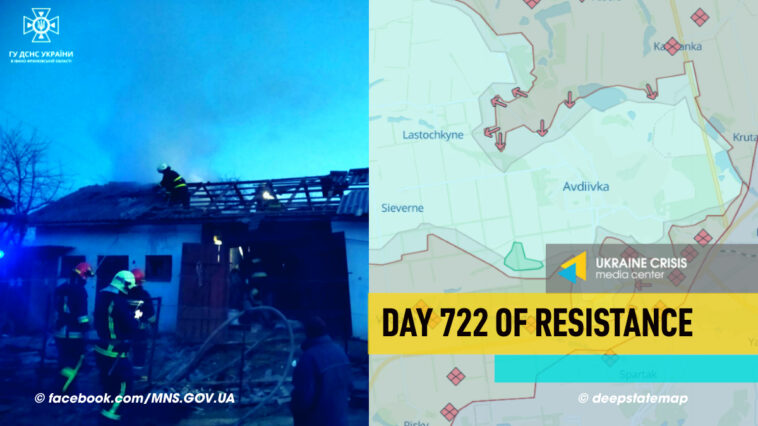The situation in Avdiyivka nears a critical phase. A massive Russian missile strike targets Kyiv, Lviv, Zaporizhzhia, among other cities across Ukraine. Survey: 40 per cent of Ukrainians trust Syrskyi, more than 90 per cent retain trust in Zaluzhnyi.
Massive Russian missile strike targets Kyiv, Lviv, Zaporizhzhia
Air alert warnings sounded across Ukraine overnight as Russia launched a massive missile attack on the country. Explosions were audible in several cities.
Ukrainian air defences shot down 13 out of 26 Russian-launched missiles. All missiles targeting the capital had been intercepted, the local authorities said.
In Zaporizhzhia, a critical infrastructure facility was hit. Six people were injured. In Dnipropetrovsk region, a missile strike damaged civilian infrastructure sites.
Ukraine’s air defenses shot down eight out of 14 Russian missiles targeting Lviv. The strike destroyed a power substation and blew out windows in three dozen buildings in the city. Some of the missiles hit a warehouse in Myrhorod, in Poltava region.
Situation in Avdiyivka nears critical phase
Supplies into Avdiyivka and evacuations from it are difficult. A reserve “logistics artery” has been activated. It was prepared in advance, spokesperson for Ukraine’s defense forces in the Tavria direction, Dmytro Lykhoviy said in televised comments.
“In Avdiyivka, where the front line is very dynamic, our units are maneuvering in some places to withdraw to better positions, in other places to take [Russian] positions. Then the main announcement is that supplies into Avdiyivka and evacuations from it are difficult. A reserve supply line has been activated, it was prepared in advance,” Lykhoviy said.
In this part of the frontline Russian forces largely outnumber Ukrainian troops. They have an advantage in air power, and their aircraft operate from beyond range of retaliation. They use KAB glide bombs and have advantage in ammunition, Lykhoviy said.
and fighting in the city involved Russian tactical assault groups that were small but growing in size.
“Armoured groups in the form of tanks and other armoured vehicles are joining them,” he said.
“There are physical limits — no matter how hard one wants to jump over a bar. As for manpower, the enemy has built up forces and is moving into built-up areas. Fighting is raging there. The enemy’s assault groups are growing in size. Armored groups in the form of tanks and other armored vehicles are joining them. [Russia] has deployed a large armada against our units that are heroically holding defensive positions in Avdiyivka,” the spokesperson said.
Unlike the Russians, Ukrainian troops “do not fight meat fights. We maneuver, and when the situation grows extremely difficult, decisions are made to move to new defensive lines,” Lykhoviy explained.
Ukraine’s Third Assault Brigade was sent in to reinforce the Ukrainian garrison in Avdiyivka, the brigade said on Thursday.
“The situation at the moment the brigade was brought in was extremely critical,” the statement released by the brigade said. Some of the battalions of the Third Assault Brigade conducted a raid into parts of Avdiyivka that were seized by the enemy. The Third Assault Brigade is deployed to a section where Russia has massed around seven brigades.
“Our fighters demonstrate unprecedented heroism,” the commander of the Third Assault Brigade, Andriy Biletskyi, wrote on Telegram. “We are forced to fight at 360 degrees against new brigades that the enemy is setting up.”
Two Russian brigades have taken critical losses in the Avdiyivka direction. The Third Assault Brigade said it will release enemy’s losses in manpower and equipment after the numbers are checked and verified.
The situation in Avdiyivka has been threatening and unstable, the message reads. The enemy continues intense rotation of troops and sends fresh manpower and materiel into the city.
Survey: 40 per cent of Ukrainians trust Syrskyi, more than 90 per cent retain trust in Zaluzhnyi
In February 2024, 40 per cent of Ukrainians said they trust the new Commander-in-Chief of the Ukrainian Armed Forces, Colonel General Oleksandr Syrskyi. Most Ukrainians (94 per cent) retain trust in former army chief, General Valeriy Zaluzhnyi, according to a survey by the Kyiv International Institute of Sociology found.
The poll was conducted between February 5 and February 10, 2023.
According to the research, 40 have confidence in Syrskyi, 21 per cent do not trust him, and four per cent are undecided. In December and February, 48 and 35 per cent respectively knew nothing about Syrskyi. Those who did, had higher trust in him.
An absolute majority of Ukrainians — 94 per cent, continue to have trust in Valeriy Zaluzhnyi. Only five per cent do not trust him.
Trust in Ukraine’s defense intelligence chief, Kyrylo Budanov was 66 per cent in February 2023, up from 60 per cent in December 2023. Only 19 per cent do not trust him.
The pollster conducted telephone interviews using software. Some 1,202 adults ages 18 and older were surveyed across Ukraine barring temporarily occupied Crimea.
The pollster conducted 874 interviews before Zaluzhnyi resigned, and 328 — after, on February 9 and 10.
Assessing Ukraine’s Diplomatic Prospects in Asia. Ukraine in Flames #573
The countries of Southeast Asia play a significant role in the fact that the Indo-Pacific region is slowly turning into the epicenter of world politics. The total population of ASEAN member states is more than 650 million, and the GDP exceeds $3.5 trillion dollars and continues to grow. It is extremely important for Ukraine to have meaningful relations with the entire region of Southeast Asia and with each state of this region. Watch Ukraine in Flames #573 to find out about Ukrainian diplomacy in the Asian region and how Ukraine can adopt the experience of Japan and South Korea in post-war modernization.
Guests:
- Alina Hrytsenko, Chief Consultant at the National Institute of Strategic Studies
- Valentyn Gladkykh, Political Analyst, Associate Professor at the Department of Sociology and Political Sciences of the National Aviation University
- Maksym Yali, Professor at the Department of International Relations, Information and Regional Studies of the National Aviation University




